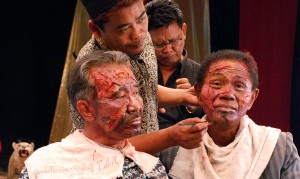
“Children are incredible.”
They really are. And so are the parents who raise them. And the ones who raise them. And the ones who raise them. And so on. And so forth. And Mamoru Hosoda’s Mirai, following a four-year-old boy named Kun who is struggling to cope with the arrival of his baby sister Mirai (and her inevitable robbery of their parents’ attention), is painfully aware of this. In what feels like his most personal piece of filmmaking to date, Hosoda explores the way this young boy’s imagination and his family’s long history come together, changing him for the better over time.
Mirai is a confirmation of many things: Mamoru Hosoda is the true successor to Hayao Miyazaki in crafting personal stories that blend fantasy and reality in unique ways; Mamoru Hosoda is a master of humanist storytelling in his own unique way; Mamoru Hosoda is a genius at creating compelling visuals with various forms of animation; and Mamoru Hosoda is probably a furry (I’m sorry I had to make the joke).
By using an episodic format, Hosoda hones in on the frustrations that come with raising a toddler and, more importantly, by the very nature of who it chose as its protagonist, being a toddler. The insecurities of parenting are as important as the insecurities of being a kid, of wondering whether you’re loved and whether you matter. Repetition is inherent to the story and it’s foolish to think that this makes the narrative inherently weaker than something structurally different (say the decade spanning Wolf Children which takes an entirely different approach and is no less brilliant).
Watching a child react in frustration and wonder for all of 100 minutes is a blessing, as ridiculous as it is heartwarming. For every moment of anger, there’s a moment of realization, these moments repeating in a fresh form with each break and each minor time jump, the last act turning everything up to 11. And it’s all paired with the persistent notion of feeling lost, of trying to feel found. “Are you saying… you’ve lost yourself?” A character asks Kun, rather directly, and he responds, “Yes.”
Mirai isn’t so much about the character Mirai, more interested in being about the past, the present, and the future—the experiences of our family directly influencing our own. In an age bogged down by explorations of inherited trauma, Hosoda is more interested in familial warmth, in familial growth, in how the smallest (or the biggest) moments in someone’s life can drastically change how they see things and how we see them. It’s a perfect culmination of the filmmaker’s work; a unique product that’s distinctly influenced by every piece that came before in the best way.
Life itself is one surreal experience after another, even when that slice of life is something as simple as letting someone win a race or putting away some dolls. Every single moment in the lives of those before us led to making us who we are now. The way Hosoda moves his camera—through time, through frames, through rooms, through perspectives—is astonishing. There’s a fluidity to the technical side of animation here and not just the aesthetic beauty that I can’t help but be blown away by, and some of the CGI bits here are jaw-droppingly gorgeous (which comes as no surprise as Hosoda has been toying with what computer animation can do since Digimon and excelling at its use since Summer Wars).
Hosoda has matured so much as an artist in a way that I could have never imagined when I was a kid watching Digimon: The Movie for the first time. But just as a large part of the child I was then remains in me now, Hosoda remains the same filmmaker he was then. As Mirai shows, we’ve both grown up, we’ve both matured, we’ve both discovered new insecurities and passions, but we’re never going to not be the person we were in the past.
—
Directed by Mamoru Hosoda; written by Mamoru Hosoda; starring Moka Kamishiraishi, Haru Kuroki, Gen Hoshino, Kumiko Asou, Koji Yakusho, Yoshiko Miyazaki, Mitsuo Yoshihara, and Masaharu Fukuyama; 98 minutes.



 Derek
Derek
 Isabelle
Isabelle